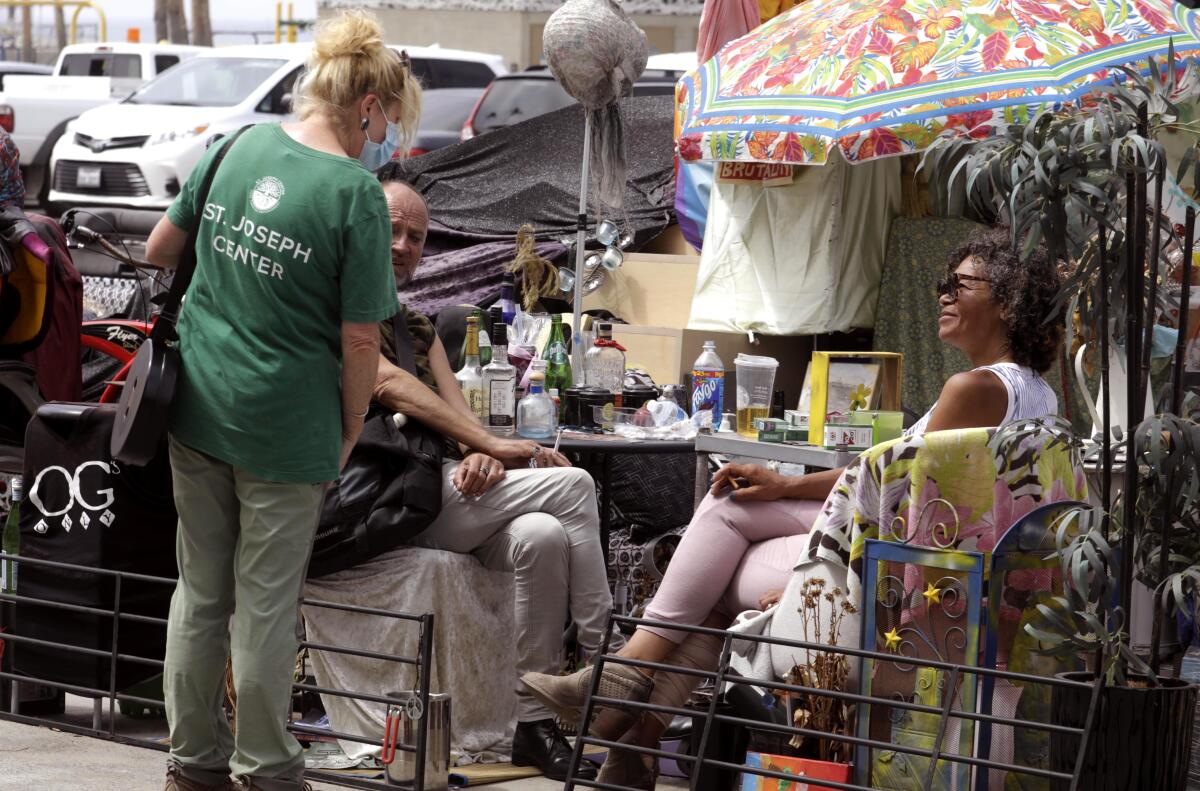Editorial: Don’t take self-determination from the mentally ill

- Share via
County governments inherited much of the state’s responsibility for mental healthcare several decades ago but have seldom been up to the task. Often this is because of inadequate funding, but counties also argue that state laws prevent them from serving people in need.
Much ire has been directed at the Lanterman-Petris-Short Act, signed into law in 1967 by Gov. Ronald Reagan to provide for treatment of people unable to see to their own needs, while ensuring that they retain their right to self-determination to the greatest extent possible. LPS, as it is known, creates several steps of intrusion into a person’s life — ostensibly for the person’s own good and the good of others — beginning with the so-called “5150 hold” that permits police and other authorities to take a person into custody for up to 72 hours for evaluation and crisis intervention.
The law also provides for a longer, 14-day hold for further assessment and treatment, and a yearlong conservatorship — pursuant to court order — that would most likely include involuntary psychiatric medication.
It’s time for critics of the Lanterman-Petris-Short Act to reconsider their approach to the state’s dire mental health crisis. The state and counties have to find a way to provide ongoing mental health care.
Critics say those government powers are not enough — that LPS makes it too difficult for the county to compel psychiatric and medical treatment, and that it is a result of an overemphasis in the 1960s on civil rights and self-determination as a response to older laws that committed thousands of Californians to mental institutions, often for life, against their will. They say the result is apparent on our streets, where the ill and unhoused pitch tents and bundle up against the cold — and too often die miserable and premature deaths. They argue that it’s time to swing the pendulum in the other direction — away from self-determination and toward health, care and human dignity.
But that’s the wrong pendulum. A society that provides physical and mental healthcare is not at odds with one that recognizes a person’s authority over his or her life and body. Nor is human dignity opposed to self-determination. In fact, those principles are deeply intertwined. The pendulum that must be swung is the one that oscillates between a (so far mostly fictional) system of adequately funded and easily accessible health and mental health services and a (all too real) system in which the only government response to a person’s crisis is to lock them up.
That’s something for lawmakers to keep in mind Wednesday, as two Assembly committees hold a daylong session to discuss possible improvements to LPS.
Changing laws to enhance human health (including mental health) and dignity should certainly be on the table. But LPS has been examined repeatedly without resulting in a consensus that the law — or its requirements for creating conservatorships that would allow involuntary psychiatric treatment — stand in the way of better care.
By all means, let the Los Angeles County Board of Supervisors move ahead with its quest to step up forcible treatment of mentally ill people who appear unable to recognize the gravity of their circumstances or seek help on their own — as long as we understand the practical limits and potential hazards of such a move.
In fact, lawmakers previously sought a state audit of LPS on a quest to determine where it fell short or went too far. And in 2020, after an exhaustive study, the state auditor reported back that no, in fact, LPS and protection of people’s right to self-determination are not the problem.
The problem is not the inability to force people into care but the lack or inadequacy of care in the first place. People on whom LPS conservatorships are already imposed may see some improvement with treatment but are discharged with inadequate follow-up services, so their mental health spirals back down.
California and its 58 counties have failed to provide the second piece of the two-part formula that was promised at the time LPS was adopted, and when President Kennedy signed into law the Community Mental Health Act four years earlier: a robust network of mental health day clinics, community centers, locked and unlocked residential hospitals and a healthcare culture that encourages, rather than penalizes, people for seeking the care they need.
As it stands now, too many people suffering severe mental illness are held in jail because there are too few facilities able to treat them.
There are certainly times when mental health conservatorships are necessary, but the state should at all times seek the least restrictive means of limiting a person’s liberty, consistent with the health and safety of that person, as well as others.
What’s missing are the essentials: sufficient humane and decent housing, paired with services that include mental healthcare, substance abuse treatment, crisis counseling and job training, along with a sense of security and community. That’s where the state and the counties have fallen short. Changing LPS is not the way to move forward on any of those needs.
More to Read
A cure for the common opinion
Get thought-provoking perspectives with our weekly newsletter.
You may occasionally receive promotional content from the Los Angeles Times.











